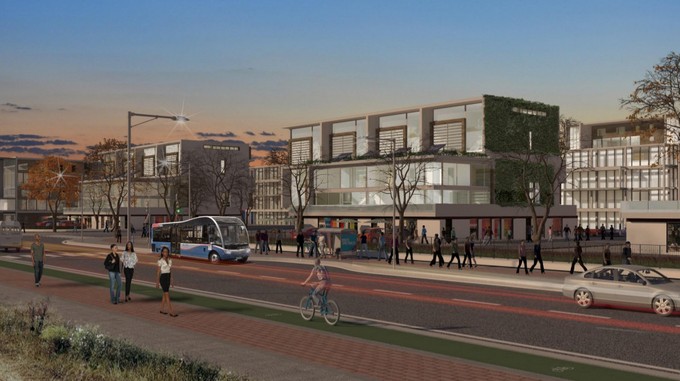

Artist’s impression of the future Old Conradie Hospital Development in Pinelands. Source: Western Cape Government
22 November 2018
The old Conradie Hospital site has been dormant since 2002. Heralded by Western Cape Premier Helen Zille, the plan for the site includes state subsidised housing (often called social housing). But the plan is facing opposition, including a court challenge from three neighbouring residents’ associations.
Two years ago the provincial departments of Transport and Public Works and Human Settlements stated, “We plan to be breaking ground on this exciting new development by early 2018.”
According to a notice published in the Western Cape Government Gazette on 26 October, ConCor Construction offered to buy the Conradie site from the province for just over R200 million. This will be a partnership called the Better Living Model. It will include affordable housing units for families earning R1,500 to R20,000 per month.
The public participation process ends on Thursday (22 November). The province can only then proceed to make a final decision on the disposal of the land. Siphesihle Dube, spokesperson for MEC of Transport and Public Works Donald Grant, said, “After the public participation process, the provincial cabinet will consider all public comments received which will inform their decision as to whether to resile from the decision to sell the property, or continue with it.”
According to the Western Cape government’s website, the development will include 3,602 homes, 10,000m² of retail space, and 14,500m² of commercial space. The plan also includes the construction of schools, a commercial centre, and park spaces.
The website says 49% of the residential development will be subsidised housing. 51% of the units will be allocated for market price paying renters.
Premier Helen Zille referred positively to the project in her 2016 State of the Province Address. She said the cabinet signed off on this “mixed-use, mixed-income, mixed tenure, residentially-led development” in December 2015, and it was an attempt to reverse the legacy of apartheid planning in the province.
Zille’s spokesperson Ewald Botha told GroundUp: “We remain confident that the Conradie Better Living Model could make a major contribution towards providing people with a place where they can live and work and attend schools, within a connected, safe and socially inclusive environment and Premier Zille is looking forward to considering all comments received with the Provincial Cabinet. At present she cannot speculate about decisions that will be informed by the ongoing public participation process.”
Nick Budlender, a researcher at housing activist group Ndifuna Ukwazi, told GroundUp: “This is the province’s big flagship project.” He said the province is going to use the Conradie site as an example model for new social housing developments in the Western Cape.
But community members in areas surrounding Conradie raised concerns about the project during the public participation process. Councillor Brian Watkyns, who represents Pinelands (Ward 53), told GroundUp that one of the community’s concerns was that the height of a proposed eight-storey building would be detrimental to the surrounding area.
The affected communities of Pinelands, Thornton, and Kensington have decided to take their objections to the Western Cape High Court. Vice-chair of the Pinelands Ratepayers and Residents Association, Riad Davids, said the government failed to consider the community’s concerns about the project. “Instead of the City meeting and speaking to us, we’ve got to go to court,” he said.
Davids said, “We called for 2,500 units instead of 3,600, for four storeys instead of eight, to make the units bigger, provide more parking, and make more recreational space.” Davids said public participation has been going on for two years, but “the province never changed one iota of the project”.
He said the Conradie project would be “lumping poor people [together] and putting them in a high density environment”.
“We have a right to give input, as neighbours. And we’re definitely not saying ‘no’ to the development,” Davids said.
Budlender said a community’s objection was very common when it came to social housing projects. “It’s not surprising that the ratepayers’ associations are combining together to object now in the disposal stage,” he said. However, he added that for an objection to have an effect in the site disposal, it needs to be based in law. Budlender is uncertain whether the issues raised by the community are enough to delay or scupper the project.
ConCor development manager Mark Schonrock said, “We haven’t had any contact with them [the provincial government]. We don’t know what’s going on during this procedural period.”
Schonrock said he was not aware of the residents’ associations taking their objections to court. “It’s just a pity that this is going to delay the project,” he said.